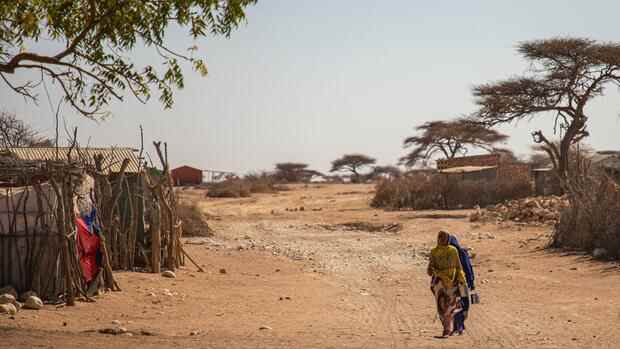davos David Beasley is used to warning, but these days the director of the UN World Food Program is warning with a new urgency: “We are facing the worst humanitarian crisis since the Second World War.” The war in Ukraine and its consequences are devastating for food security around the world. “We will have famines.”
Even before the war in Ukraine, the food situation was disrupted by droughts and delivery problems as a result of the Covid lockdowns. Now, Beasley said, the Russian blockade of Ukraine’s ports is taking a country out of global food production that normally feeds 400 million people. In addition, there would be higher fuel and transport costs for the farmers – and the lack of fertilizer from Russia and Belarus for the next harvest worldwide. “It’s the perfect storm.”
Food prices are at record levels this spring, according to the index of the UN Agricultural Organization (FAO). Cooking oil, cereals, dairy products: everything is more expensive. The situation is likely to worsen in the coming months if no fertilizer comes from the important export countries Russia and Belarus, which means there is a risk of lower harvests in North and South America, Africa and Asia.
The world is still talking about increased food prices, says the head of the World Food Program. But soon enough food could simply not be available worldwide.
Top jobs of the day
Find the best jobs now and
be notified by email.
The warnings have now reached the highest political levels. “The signs of a growing food crisis are obvious,” says EU Commission President Ursula von der Leyen in Davos. “We must act urgently.”
Countermeasures are extremely difficult
But quick countermeasures are difficult. For example, Russia is blocking the ports in Ukraine, preventing the export of the grain. According to EU figures, 20 million tons of wheat are stuck in Ukraine. Only a fraction of the five million tons that normally leave the country reach customers via alternative overland routes.
Global criticism of Russia’s handling of wheat exports is growing.
(Photo: AP)
Von der Leyen criticizes that Russian President Vladimir Putin uses food and energy as a weapon. Beasley calls it a “declaration of war on global food security.”
Experts are unanimously calling for the ports to be opened up now in order to free up the grain silos in Ukraine for the next harvest. Ukrainian President Volodymyr Zelensky is trying to negotiate a transport zone in the Black Sea with the help of European countries.
So far, however, the Kremlin only wants to ease the blockade if the sanctions against Russia are relaxed. In addition, Russia now only supplies its own grain to selected countries.
Because the Ukrainian ports are blocked, exports from the country have come to a standstill – with far-reaching consequences.
(Photo: AP)
Erik Fyrwald, CEO of the agricultural technology company Syngenta, also predicts that the situation will get worse in the coming weeks and months. And experts agree that emerging and developing countries will suffer the most.
The number of people with acute hunger problems has risen from 135 to 325 million people since the start of the Covid pandemic. While oil prices have recently fallen, those for food have continued to rise, observes the head of the International Monetary Fund (IMF), Kristalina Georgieva. “We can reduce consumption of oil, but not of food.” She is concerned that the price hike could trigger social and political unrest in emerging and developing countries.
This last happened in 2007 and 2008. Now the conditions are far worse, says Beasley and warns of mass migration.
At the World Economic Forum, there is a lot of talk about fighting food waste. It is also about new agricultural technologies and the demand not to build additional barriers after the export bans on wheat in India and palm oil in Indonesia.
Farmers in Africa are already suffering
Investments in Africa are part of the international solution strategy to combat famine. “We’re all looking at the terrible war in Ukraine right now, but we have similar challenges on our continent,” says Vice President of Tanzania Philip Isdor Mpango, referring to the armed conflicts on the continent. If the guns fell silent, investing in Africa’s agricultural sector could benefit everyone.
The Vice President reports increasing international interest and investment. These are necessary. Due to the lack of warehouses, the post-harvest losses on the continent are around a third. If Africa could net export food instead of importing it, the whole world could benefit, von der Leyen also argues. But these are long-term plans that will hardly help this year.
“We are heading for a crisis like we haven’t seen in decades,” says Saskia Bruysten, CEO of Yunus Social Business. In Uganda, one of the many countries where the crisis is currently escalating, numerous farmers have not been able to afford the fertilizers for months. This reduces their yield by 70 percent.
But the farmers do not even get an acceptable price for the remaining harvest. Because fuel prices have risen so much, transporting the harvest to the next town is too expensive. Farmers have to sell corn and beans at dumping prices on their own doorsteps. However, many of the smallholders were barely able to survive even before this crisis began.
The situation is exacerbated by climate change. In countries like Kenya, rising temperatures are causing “shocking suffering,” reports Kenyan climate activist Elizabeth Wahuti. “Camels, cows and other farm animals are dying of thirst in large numbers.” The result is sheer desperation among the people.
More: 40 million tons of grain are stored in Ukraine – How the wheat should come out of the country
